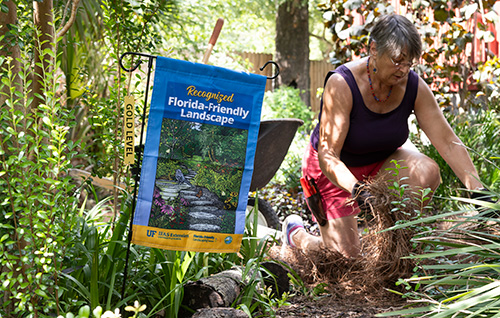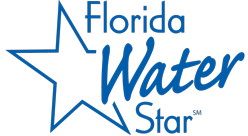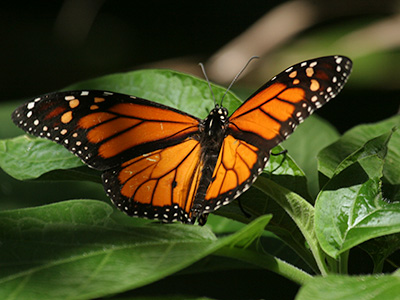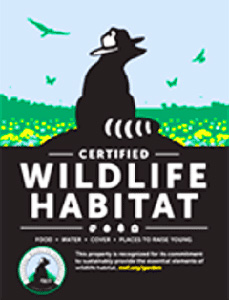Recognition for Your Florida-Friendly Yard

Home landscapes can be a tool for wildlife conservation and serve an important role in the local ecosystem. Bringing in certain plants and other elements to your yard or garden can have a positive effect on the local environment and provide food, water, and shelter for pollinators and other wildlife. Whether you already have a yard that embraces these qualities, or you wish to make an impact by transforming your landscape, there are multiple organizations that can recognize your achievements or help you get there.
Florida-Friendly Landscape Recognition
The Florida-Friendly Landscaping™ (FFL) Program from UF/IFAS Extension promotes sustainable landscape practices. The program provides guidance on research-based gardening methods that are low impact and environmentally friendly. Through their free landscape recognition program, FFL aims to honor landscapes that conserve water, protect water quality, and support wildlife. An Extension agent or Master Gardener Volunteer will evaluate the landscape using a checklist of FFL practices, which includes principles such as right plant, right place, managing yard pests responsibly, and fertilizing appropriately. FFL-recognized landscapes are eligible to receive a yard flag or sign to display as well as a certificate. There are three different recognition levels. Find more information about the Florida-Friendly landscape recognition program on their website.
Another way to show your support for Florida’s water and natural resources is by signing the FFL Pledge. This pledge provides a straightforward way for individuals interested in adopting Florida-Friendly Landscaping™ principles to commit to one or more of the nine core practices. Your commitment will be displayed on the FFL website’s “dashboard.” If you have any questions about making your landscape more Florida-Friendly, reach out to your local UF/IFAS county Extension office.
Florida Water Star Home Certification

Florida Water Star is a certification program for homes and commercial developments that evaluates water use to promote water conservation. The certification program uses standards and guidelines for indoor fixtures and appliances, landscape design, and irrigation systems. Landscape criteria include watering according to plant needs and using site-appropriate, drought-tolerant plants. Properties are assessed by a Florida Water Star inspector and there are two certification levels. Learn more at the Florida Water Star website.
North American Butterfly Association Certificate Program
The North American Butterfly Association is a nonprofit working to help butterflies thrive and encourages people to enjoy live, wild butterflies. The association’s program will certify your garden as suitable butterfly habitat for resting and feeding. The garden must contain at least three caterpillar food plants, at least three different butterfly nectar sources, and should be devoid of insecticides and pesticides. You can apply online or via mail, and a certificate will be issued. “Certified Butterfly Garden” signs can be purchased once you have been issued a certificate. Learn more about the certification program at their website.

Monarch Waystation Habitat Registration
The Monarch Waystation Program recognizes and promotes the establishment of monarch butterfly habitat to support this species on their migration across the U.S. to Mexico. These waystations provide the resources necessary for the monarchs to survive and reproduce on the long journey. Gardeners can have their garden certified as monarch habitat by creating a waystation and filling out an application online or via mail. The garden must include ample sun and shelter, with close rows of milkweed and nectar plants. A metal “Monarch Waystation” sign can be purchased to identify your habitat as an official Monarch Waystation. Find more information by visiting the Waystation Registration page on their website.
Xerces Society Pollinator Protection Pledge
Xerces Society for Invertebrate Conservation is an international nonprofit organization that works to protect and conserve invertebrates and their habitats. Xerces Society promotes pollinator conservation in the garden to help create spaces for pollinators to thrive and to spread awareness about these important creatures. They encourage the establishment of yards that provide flowering plants for pollen and nectar as well as access to shelter and nesting sites. Sign their Pollinator Protection Pledge and vow to provide habitat to pollinators and protect them from pesticides. You may purchase a “Pollinator Habitat” sign for your garden. Learn more about the Pollinator Protection Pledge on their website.
UF Florida Backyard Landscapes for Wildlife Program Certification
The UF/IFAS Florida Wildlife Extension provides programs that support the use, conservation, management, and appreciation of wildlife resources. They offer a yard certification program—Florida Backyard Landscapes for Wildlife—that helps home gardeners cater to birds and other wildlife. The program includes information on how to design a wildlife refuge in your yard with tips on how to better attract desired wildlife species. Upon meeting the criteria, you will be supplied with a certificate and yard sign. Applications can be requested from your specific county. Learn more about the Florida Backyard Landscapes for Wildlife program.
National Wildlife Federation Certified Wildlife Habitat®
The National Wildlife Federation (NWF) aims to ensure wildlife and people thrive in an ever-changing world. NWF’s Certified Wildlife Habitat® program promotes landscapes that invite wildlife into the yard or neighborhood. Gardens that are Certified Wildlife Habitat® should include native plants, water sources, cover for protection, and places to raise young. These habitats should be managed using sustainable practices such as practicing soil and water conservation and reusing plant materials. Once certified you will receive a certificate and a one-year National Wildlife Federation membership, among other benefits. “Certified Wildlife Habitat®” signs are available for purchase. Learn more about Certified Wildlife Habitat® recognition for home landscapes at the NWF website.
Who knew you could become a wildlife conservationist from your own backyard? By creating suitable habitat and adopting sustainable gardening practices you can transform your yard into a paradise for beneficial critters and local wildlife. Whether your outdoor space becomes a waystation for monarchs or a safe haven for birds, your hard work can be recognized by multiple reputable organizations.
Also on Gardening Solutions
- Creating Wildlife Habitats with Dead Wood
- How Can My Yard Contribute to Community Ecology?
- Wildlife-Friendly Winter Gardens
- More on gardening with wildlife

